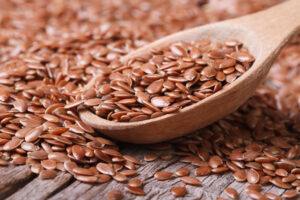Written by Taylor Woosley, Staff Writer. Results of this meta-analysis of 33 trials with 2427 subjects using a dose-response analysis indicated a trend to a significant impact of flaxseed dosage on systolic blood pressure (Pnon-linear) = 0.04).
 Cardiovascular events are responsible for more than 18 million deaths each year, which is around one third of all global deaths1. High blood pressure, also known as hypertension, is one of the most important risk factors for ischemic heart disease, stroke, other cardiovascular diseases (CVD), and chronic kidney disease2. Hypertension comprises the structural and functional integrity of the cerebral microcirculation, promoting microvascular rarefaction, cerebromicrovascular endothelial dysfunction, and neurovascular uncoupling3.
Cardiovascular events are responsible for more than 18 million deaths each year, which is around one third of all global deaths1. High blood pressure, also known as hypertension, is one of the most important risk factors for ischemic heart disease, stroke, other cardiovascular diseases (CVD), and chronic kidney disease2. Hypertension comprises the structural and functional integrity of the cerebral microcirculation, promoting microvascular rarefaction, cerebromicrovascular endothelial dysfunction, and neurovascular uncoupling3.
Hypertension treatment is usually based on drug administration yet adopting a nutritious diet may act favorably in many pathophysiological mechanisms responsible for blood pressure elevation, both acutely and after long-term use4. Due to its high content of lignans, fiber, and α-linolenic acid (ALA), flaxseed has been recognized as a functional food that may reduce hypertension by regulation of inflammatory pathways5. Epidemiological studies show that dietary ALA is associated with lower prevalence of hypertension and lower systolic pressure6.
Li et al. conducted a systemic review and meta-analysis to investigate the effects of flaxseed and its derivatives on adults’ blood pressure (BP) in normotensive and hypertensive subjects. Inclusion criteria for the study included parallel or cross-over clinical trials investigating the impact of flax seed on BP, with available baseline and end-of-trial BP values in both intervention and control groups and had a supplement duration with flaxseed of a minimum of two weeks. Mean differences and SD for both the intervention and control groups were extracted to analyze the effect size from BP markers.
33 trials were included in the final meta-analysis with a total of 2427 participants (case = 1220; control = 1207). 28 studies were parallel studies and five were crossover studies. Intervention duration ranged from 3 to 48 weeks and the sample size ranged from 14 to 189 subjects. Significant findings of the meta-analysis are as follows:
- The overall estimate from the random-effect model performed on 33 studies with 43 arms, including 1220 cases and 1207 controls, shows that flaxseed had a significant effect on SBP (WMD: -3.19 mmHg; 95% CI: -4.14 to -2.24, p < 0.001).
- Results of the analysis of 32 RCTs with 41 arms including 1201 cases and 1193 controls indicated that flaxseed supplementation significantly reduced DBP (WMD = -2.61 mmHg; 95% CI: -3.27, -1.94, p < 0.001; I2 = 94.1%, p < 0.001).
- Dose-response analysis indicated a trend to a significant impact of flaxseed dosage on SBP (Pnon-linear) = 0.04). The most substantial reduction was at dosage ≥30 g day.
Results of the meta-analysis show that flaxseed oil has an improving effect against BP. Furthermore, study durations of 20 weeks or more experienced more beneficial effects on SBP and DBP, along with using lignan extract and whole flaxseed. Study limitations include the small number of participants in most included studies, the use of different varieties of flaxseed, and the heterogenous patient characteristics and study designs in most studies used for the meta-analysis.
Source: Li, Lingou, Hanzhang Li, Yuzhen Gao, Xingyu Zhang, and Mei Yang. “Effect of flaxseed supplementation on blood pressure: a systematic review, and dose–response meta-analysis of randomized clinical trials.” Food & Function (2023).
© The Royal Society of Chemistry 2023
Click here to read the full text study.
Posted March 23, 2023.
Taylor Woosley studied biology at Purdue University before becoming a 2016 graduate of Columbia College Chicago with a major in Writing. She currently resides in Glen Ellyn, IL.
References:
- Luo D, Cheng Y, Zhang H, et al. Association between high blood pressure and long term cardiovascular events in young adults: systematic review and meta-analysis. Bmj. Sep 9 2020;370:m3222. doi:10.1136/bmj.m3222
- Zhou B, Perel P, Mensah GA, Ezzati M. Global epidemiology, health burden and effective interventions for elevated blood pressure and hypertension. Nat Rev Cardiol. Nov 2021;18(11):785-802. doi:10.1038/s41569-021-00559-8
- Ungvari Z, Toth P, Tarantini S, et al. Hypertension-induced cognitive impairment: from pathophysiology to public health. Nature reviews Nephrology. Oct 2021;17(10):639-654. doi:10.1038/s41581-021-00430-6
- Moschonis G, Karatzi K. Novel Dietary Approaches for Controlling High Blood Pressure. Nutrients. Dec 21 2020;12(12)doi:10.3390/nu12123902
- Haghighatsiar N, Askari G, Saraf-Bank S, Feizi A, Keshmiri H. Effect of Flaxseed Powder on Cardiovascular Risk Factor in Dyslipidemic and Hypertensive Patients. Int J Prev Med. 2019;10:218. doi:10.4103/ijpvm.IJPVM_563_17
- Prasad K. Importance of Flaxseed and its Components in the Management of Hypertension. Int J Angiol. Sep 2019;28(3):153-160. doi:10.1055/s-0039-1678691
